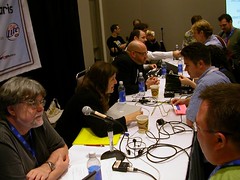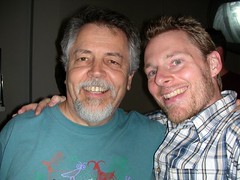SXSWi: tech assessment
I'm like the blog dork version of Sir Edmund Hillary, lugging my backpack full of digital survival gear around SXSW. I'm as lean as I dare, although a notebook, digital camera, iPod, and requisite power cords and USB cables still seems like quite a load while trying to squeeze into the one empty seat across a row of attendees.
There is, of course, LOTS of personal technology on display at SXSWi, and it makes an interesting statement about the blogging community relative to the general population. Or at least the population I'm used to seeing at more mainstream technology conferences.
First of all, Mac penetration is far beyond my expectations. I assumed that the heavy representation of coder / linux types would naturally lean towards a PC environment, but apparently the evolution of web-based architectures has freed up a majority of SXSW-ers to think different, just like everyone else. I'd place Mac penetration at a conservative 60% across the observed interactive crowd. Sometimes it seems larger, although the glowing Apple icons and reliance on powercord tethering might make the Macs overly visible. The remaining PC drones are an even split among brands, Dell's otherwise ubiquitous global domination having eluded much of this savvy crowd ... except me.
PCs and Macs alike are liberally adorned with a series of bumper stickers and alterna-logos, especially among the panelists. Some of the messages are purely for tech identification ("you are SO off my buddy list"), but many are of various products and websites that are vying for attention at the conference. It creates an interesting dichotomy of individualization defined by brand devotion; the new Iconoclasts are selectively loyal rather than abstractly independent.
And then there are the gadgets, or more specifically the absence thereof. I've seen loads of CE / blackberry phones, but where are all the iPods? SXSW offered a downloadable schedule in iPod format, so I expected loads of techie people to be wheeling their way through session listings. Not so, although this could be because the iPod is an absolutely sucky way to access any information, even music. In that same vein, notepads (the paper kind) are almost as common as notebooks and printed schedules are the default organizational tool.
There is, of course, LOTS of personal technology on display at SXSWi, and it makes an interesting statement about the blogging community relative to the general population. Or at least the population I'm used to seeing at more mainstream technology conferences.
First of all, Mac penetration is far beyond my expectations. I assumed that the heavy representation of coder / linux types would naturally lean towards a PC environment, but apparently the evolution of web-based architectures has freed up a majority of SXSW-ers to think different, just like everyone else. I'd place Mac penetration at a conservative 60% across the observed interactive crowd. Sometimes it seems larger, although the glowing Apple icons and reliance on powercord tethering might make the Macs overly visible. The remaining PC drones are an even split among brands, Dell's otherwise ubiquitous global domination having eluded much of this savvy crowd ... except me.
PCs and Macs alike are liberally adorned with a series of bumper stickers and alterna-logos, especially among the panelists. Some of the messages are purely for tech identification ("you are SO off my buddy list"), but many are of various products and websites that are vying for attention at the conference. It creates an interesting dichotomy of individualization defined by brand devotion; the new Iconoclasts are selectively loyal rather than abstractly independent.
And then there are the gadgets, or more specifically the absence thereof. I've seen loads of CE / blackberry phones, but where are all the iPods? SXSW offered a downloadable schedule in iPod format, so I expected loads of techie people to be wheeling their way through session listings. Not so, although this could be because the iPod is an absolutely sucky way to access any information, even music. In that same vein, notepads (the paper kind) are almost as common as notebooks and printed schedules are the default organizational tool.



